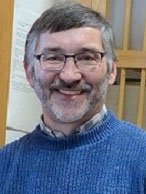Bill Peterson
Professor of Mathematics and Statistics

- Office
- Warner 213
- Tel
- (802) 443-5417
- wpeterso@middlebury.edu
- Office Hours
- Monday 2:30-4:00 PM, Tuesday 1:00-2:00 PM, Wednesday 3:15-4:15 PM, Friday 11:00 AM-12:00 PM
Courses Taught
MATH 0116
Intro to Statistical Science
Course Description
Introduction to Statistical Science
A practical introduction to statistical methods and the examination of data sets. Computer software will play a central role in analyzing a variety of real data sets from the natural and social sciences. Topics include descriptive statistics, elementary distributions for data, hypothesis tests, confidence intervals, correlation, regression, contingency tables, and analysis of variance. The course has no formal mathematics prerequisite, and is especially suited to students in the physical, social, environmental, and life sciences who seek an applied orientation to data analysis. (Credit is not given for MATH 0116 if the student has taken ECON 0111 (formerly ECON 0210) or PSYC 0201 previously or concurrently.) 3 hrs. lect./1 hr. computer lab.
Terms Taught
Requirements
MATH 0122
Current
Calculus II
Course Description
Calculus II
A continuation of MATH 0121, may be elected by first-year students who have had an introduction to analytic geometry and calculus in secondary school. Topics include a brief review of natural logarithm and exponential functions, calculus of the elementary transcendental functions, techniques of integration, improper integrals, applications of integrals including problems of finding volumes, infinite series and Taylor's theorem, polar coordinates, ordinary differential equations. MATH 0121 or equivalent, or by placement) 4 hrs. lect/disc.
Terms Taught
Requirements
MATH 0200
Linear Algebra
Course Description
Linear Algebra
Matrices and systems of linear equations, the Euclidean space of three dimensions and other real vector spaces, independence and dimensions, scalar products and orthogonality, linear transformations and matrix representations, eigenvalues and similarity, determinants, the inverse of a matrix and Cramer's rule. (MATH 0121 or equivalent, or by placement) 3 hrs. lect./disc.
Terms Taught
Requirements
MATH 0310
Probability
Course Description
Probability
An introduction to the concepts of probability and their applications, covering both discrete and continuous random variables. Probability spaces, elementary combinatorial analysis, densities and distributions, conditional probabilities, independence, expectation, variance, weak law of large numbers, central limit theorem, and numerous applications. (Concurrent or prior: MATH 0223 or MATH 0224) 3 hrs. lect./disc.
Terms Taught
Requirements
MATH 0410
Current
Stochastic Processes
Course Description
Stochastic Processes
Stochastic processes are mathematical models for random phenomena evolving in time or space. This course will introduce important examples of such models, including random walk, branching processes, the Poisson process and Brownian motion. The theory of Markov chains in discrete and continuous time will be developed as a unifying theme. Depending on time available and interests of the class, applications will be selected from the following areas: queuing systems, mathematical finance (Black-Scholes options pricing), probabilistic algorithms, and Monte Carlo simulation. (Concurrent or prior MATH 0200, and MATH/STAT 0310) 3 hrs. lect./disc.
Terms Taught
Requirements
MATH 0500
Current
Upcoming
Advanced Study
Course Description
Advanced Study
Individual study for qualified students in more advanced topics in algebra, number theory, real or complex analysis, topology. Particularly suited for those who enter with advanced standing. (Approval required) 3 hrs. lect./disc.
Terms Taught
MATH 0710
Advanced Probability Seminar
Course Description
Advanced Probability Seminar
An introduction to the mathematical foundations of Probability for students who have completed work in Probability and Real Analysis. The central ideas correspond to the Lebesgue theory of measure and integration. Probability provides additional perspective and motivates intriguing applications of the theory, which students will explore in their final projects. Working independently and in small groups, students will gain experience reading advanced sources and communicating their insights through expository writing and oral presentations. This course fulfills the capstone senior work requirement for the mathematics major. (MATH 310 and MATH 323)
Terms Taught
STAT 0116
Intro to Statistical Science
Course Description
Introduction to Statistical Science (formerly MATH 0116)
A practical introduction to statistical methods and the examination of data sets. Computer software will play a central role in analyzing a variety of real data sets from the natural and social sciences. Topics include descriptive statistics, elementary distributions for data, hypothesis tests, confidence intervals, correlation, regression, contingency tables, and analysis of variance. The course has no formal mathematics prerequisite, and is especially suited to students in the physical, social, environmental, and life sciences who seek an applied orientation to data analysis. (Not open to students who have taken BIOL 0211 or ECON 0111 (formerly ECON 0210) or PSYC 0201) 3 hrs. lect./1 hr. computer lab.
Terms Taught
Requirements
STAT 0710
Advanced Probability Seminar
Course Description
Advanced Probability Seminar
An introduction to the mathematical foundations of Probability for students who have completed work in Probability and Real Analysis. The central ideas correspond to the Lebesgue theory of measure and integration. Probability provides additional perspective and motivates intriguing applications of the theory, which students will explore in their final projects. Working independently and in small groups, students will gain experience reading advanced sources and communicating their insights through expository writing and oral presentations. This course fulfills the capstone senior work requirement for the mathematics major. (MATH 310 and MATH 323)
Terms Taught
Academic Degrees
A.B., Dartmouth College; M.S., Ph.D., Stanford University;
Applied Probability, Stochastic Processes
